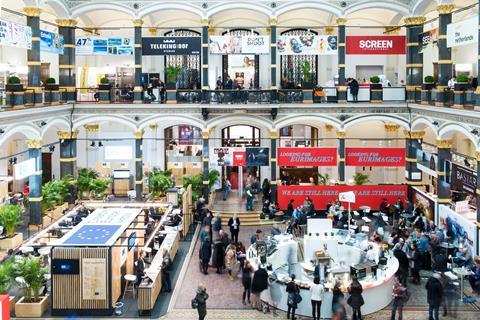After a challenging few years for the Berlinale, could the 2025 edition under new leadership mark a reset for the festival and its market? European film buyers and sellers share their thoughts with Screen.

European film buyers and sellers are at the Berlinale this week after a challenging few years for the German festival and its market. Covid disruptions hit the winter event hard, politics have often overshadowed the films and the festival’s programming line-up has been too niche for many buyers’ tastes.
In particular it has lacked the kind of crossover arthouse hits seen at Cannes, such as The Substance, The Zone Of Interest, Perfect Days and Anatomy Of A Fall, which have all delivered strong commercial returns for distributors worldwide. Many industry executives think Cannes has pulled even further ahead of Berlin as both a festival and a market since the pandemic.
This year, some believe the European Film Market (EFM) may be quieter compared to 2024’s edition, when a slew of US packages held up by the actors and writers strikes came to the market. There may also be fewer projects announced than in previous years, as Los Angeles-based executives focus on more pressing personal matters after the city’s wildfires.

“The sense is that there are not a lot of packages coming to Berlin,” says David Kehrl, head of acquisitions and international co-productions at Germany’s Constantin Film. “If they do come, it will be very last-minute. Recent events have meant people’s focus is on more important things. It has likely held up deal-making.”
While it lacks the glamour and heft of Cannes, European film executives say Berlin remains a useful, efficient and relatively affordable place to meet colleagues from around the world and to do business.
There is also enthusiasm for the festival’s new leadership, with many hoping festival director Tricia Tuttle, who delivers her first Berlinale this year, will bring bigger films, more stars and extra glamour to Berlin. The appointment of sales veteran Tanja Meissner as director of industry strand Berlinale Pro, including EFM, has also gone down well.
“There is a tremendous amount of goodwill towards Tricia, and there’s a willingness from rightsholders, producers and filmmakers to give it a try in Berlin,” says Thorsten Ritter, EVP acquisitions, sales and marketing at Beta Cinema, whose slate includes Berlinale opening film The Light by Tom Tykwer. “In a way, it’s a fresh start.”
Renewed vitality

Ritter is excited, too, for this year’s EFM under Meissner. “She is a super respected person, knows all sides of the business and is very connected to the industry. You just sense a positive vibe and spirit going into this year’s market.”
The contrast with the American Film Market (AFM), which underwhelmed during its temporary move to Las Vegas last year, has only increased the goodwill towards EFM. “The stands in the beautiful Gropius Bau are much better than the suites in a Las Vegas hotel. The environment is friendly and inviting,” says Ritter.
For many, a trip to EFM means navigating several venues. The Gropius Bau tends to house European arthouse buyers and sellers, while many US and UK executives operate out of hotels such as The Ritz-Carlton and the Marriott, as well as Soho House. Among the European contingent, the mood is relatively positive going into EFM.
“The space I operate in is pretty healthy,” says Jan Naszewski, CEO of New Europe Film Sales, whose slate includes Sarah Miro Fischer’s Panorama title The Good Sister and Generation Kplus animation Tales From The Magic Garden.
“European buyers are looking for European films. A lot of people were very happy with movies like The Substance, which did very well everywhere. The general mood of the market is not bad. People want to do business.”
Films Boutique founder Jean-Christophe Simon, who heads to EFM with a slate including Competition title Girls On Wire by Chinese director Vivian Qu, says Berlin differs from other festivals like Cannes and Venice. “You can discover films and filmmakers that you would not expect to find in other places, particularly artistic and political filmmakers,” he says. “We met a lot of the filmmakers we work with now in Berlin.”
He also stresses EFM’s important role as “one of the first meeting points for the international industry at the beginning of the year”.
Kim Foss, managing director of Danish distributor Camera Film, is heading to Berlin looking for films that have “artistic value and commercial potential at the same time”, having recently enjoyed local box-office success with releases such as Wim Wenders’ Perfect Days and Hayao Miyazaki’s The Boy And The Heron.

For him, the Berlinale line-up of recent years has veered more towards the arthouse, with not enough commercial titles. “I hate to use the word commercial when it comes to arthouse films,” says Foss, “but at the end of the day we have to sell tickets.”
Since the pandemic, he thinks audiences are taking fewer risks and are being much more selective about the films they choose to watch in cinemas. “Generally, everybody is running in the same direction. Perfect Days was a big hit for us, and for all my distributor colleagues around the world. But there are many films that are performing poorly — or not performing at all.”
Return of the glitz
Constantin’s Kehrl thinks the Berlinale line-up looks more audience-friendly this year, specifically the out-of-competition special-presentation titles. “We see some big American films there,” he notes. “That will hopefully bring back some of the glamour that has been missing from the Berlinale.”
Constantin releases around 15 films a year; many are commercially focused titles, but its slate also includes crossover arthouse films such as September 5 and Babygirl. But Berlin has not premiered the big arthouse titles of recent years, observes Kehrl.
“The films that are usually in awards contention are usually from Cannes, Venice and maybe Toronto, but not so much Berlin. Maybe that will change with the Berlinale’s new leadership.”
EFM has not been one of the big markets for Constantin, either. “American and Asian buyers and sellers seem to have been more reluctant to come to Berlin since Covid,” he says. “We’ve seen a concentration towards Cannes more and more, which continues to be the strongest market. So our expectation in terms of seeing pre-buy packages is not super high.”
Kehrl points out that Constantin has a full slate for 2025 and early 2026. “We are not in a rush to buy,” he says. “But if there is something special that comes along that we like, we’ll try to grab it.”
Alex Janssen, SVP of acquisitions at German distributor Leonine, is heading to EFM after one of its busiest markets here last year, where it pre-bought titles including Luc Besson’s Dracula: A Love Tale and Derek Cianfrance’s Roofman starring Channing Tatum.
Leonine releases about 24 titles a year, with about 75% coming from international partners; in 2024 it enjoyed success with commercial titles such as The Beekeeper through to arthouse hits including The Zone Of Interest.
Going into this year’s market, Leonine is looking to fill up its 2026 slate and beyond. Pre-buys at script stage comprise 80% of its film acquisitions. Janssen says EFM remains a priority market alongside Cannes and AFM. “For what we are looking for, EFM is the start-up to the year,” he says. “But I do know that certain sales agents and producers would rather launch something in Cannes than Berlin, because it makes for flashier press.”
Still, he thinks the market-going has changed anyway since the pandemic, given the rise of video calls. “You do pinpoint markets in the calendar. Things get launched and there is a real sense of urgency. But things are also happening much more between markets.”
Buyers and sellers say they remain optimistic about the general state of the film sales and acquisition market. Several European markets are showing decent demand for arthouse titles, among them Italy and Spain. Vue’s launch of an arthouse distribution label in the UK, Vue Lumière, is seen as a positive development. Many stress the importance of movies that deliver a real sense of theatrical experience and make it worthwhile for potential viewers to go to the cinema at a time when it is so convenient to stream content at home.
“A lot of it is about originality, surprise and pushing the envelope,” says Beta’s Ritter, citing the success of films such as The Substance and The Zone Of Interest at cinemas worldwide.
“I’m not gloomy,” says New Europe’s Naszewski. “People might say genre is the only thing that works, but that’s not necessarily true. We are auteur-driven and there are a number of arthouse labels that follow the good directors who make films for cinema rather than streaming.”
Adds Films Boutique’s Simon: “Even if the box office is not great everywhere, you still have regular successes.”






![The Brightest SunScreen[Courtesy HKIFF]](https://d1nslcd7m2225b.cloudfront.net/Pictures/274x183/3/5/0/1448350_thebrightestsunscreencourtesyhkiff_312678.jpg)


















No comments yet